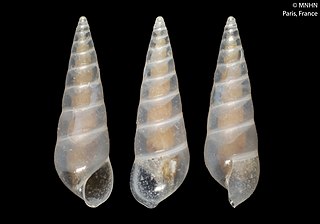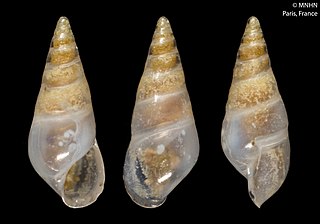
Bathycrinicola is a genus of medium-sized sea snails, marine gastropod mollusks in the family Eulimidae.

Bulimeulima is a genus of medium-sized sea snails, marine gastropod mollusks in the family Eulimidae.

Bulimeulima magna is a species of medium-sized sea snail, a marine gastropod mollusk in the family Eulimidae. The species is one of two known species to exist within the genus Bulimeulima; the other congener is Bulimeulima incolorata.
Campylorhaphion machaeropse is a species of sea snail, a marine gastropod, in the family Eulimidae.

Crinolamia is a genus of medium-sized sea snails, marine gastropod mollusks in the family Eulimidae.

Crinolamia angustispira is a species of sea snail, a marine gastropod mollusk in the family Eulimidae.

Curveulima obliquistoma is a species of sea snail, a marine gastropod mollusk in the family Eulimidae. The species is one of a number within the genus Curveulima.

Eulima anonyma is a species of sea snail, a marine gastropod mollusk in the family Eulimidae. The species is one of a number within the genus Eulima.

Eulima chionea is a species of sea snail, a marine gastropod mollusk in the family Eulimidae. The species is one of a number within the genus Eulima.
Eulima devistoma is a species of sea snail, a marine gastropod mollusk in the family Eulimidae. The species is one of a number within the genus Eulima.

Eulima strongylostoma is a species of sea snail, a marine gastropod mollusk in the family Eulimidae. The species is one of a number within the genus Eulima.

Fuscapex is a genus of sea snails, marine gastropod mollusks in the family Eulimidae.

Fuscapex cabiochi is a species of sea snail, a marine gastropod mollusk in the family Eulimidae.

Fuscapex major is a species of sea snail, a marine gastropod mollusk in the family Eulimidae.

Fuscapex talismani is a species of medium-sized sea snail, a marine gastropod mollusk in the family Eulimidae.

Fusceulima projectilabrum is a species of sea snail, a marine gastropod mollusk in the family Eulimidae.
Halielloides is a genus of sea snails, marine gastropod mollusks in the family Eulimidae.

Hemiaclis is a genus of sea snails, marine gastropod mollusks in the family Eulimidae.
Hemiaclis major is a species of sea snail, a marine gastropod mollusk in the family Eulimidae.

Hemiaclis obtusa is a species of sea snail, a marine gastropod mollusk in the family Eulimidae.











